
EXPERIMENTAL ECONOMICS
Scope & Guideline
Catalyzing new ideas in the realm of experimental economics.
Introduction
Aims and Scopes
- Behavioral Economics:
The journal focuses on how psychological factors influence economic decision-making, exploring topics such as risk preferences, fairness, and social norms. - Game Theory Applications:
It emphasizes experimental investigations of strategic interactions and game-theoretic models, providing insights into cooperation, competition, and bargaining. - Public Goods and Collective Action:
Research in this area examines how individuals contribute to public goods and the dynamics of cooperation in group settings, often under varying institutional frameworks. - Market Mechanisms and Auction Theory:
The journal covers experimental studies on auction designs, market structures, and trading behaviors, contributing to the understanding of market efficiency and outcomes. - Decision-Making Under Uncertainty:
It investigates how individuals make choices in uncertain environments, including studies on ambiguity, risk attitudes, and information acquisition. - Cognitive and Behavioral Insights:
The journal highlights cognitive biases, learning processes, and the impact of social and emotional factors on economic decisions.
Trending and Emerging
- Impact of Social Media on Economic Decisions:
Recent papers have begun to explore how social media influences economic behavior, particularly in contexts like donation behavior and public good provision, highlighting the role of communication in shaping economic outcomes. - Experimental Studies on Team Dynamics:
There is an increasing emphasis on understanding how team dynamics and collective decision-making processes affect economic outcomes, with research investigating cooperation and competition within groups. - Behavioral Responses to Uncertainty and Crises:
Emerging studies are focusing on how individuals and organizations respond to crises, such as the COVID-19 pandemic, exploring changes in behavior, risk perception, and pro-social actions. - Cognitive Modeling in Economic Behavior:
The integration of cognitive modeling techniques to better understand decision-making processes is gaining traction, providing deeper insights into preferences and behaviors under various conditions. - Field Experiments for Real-World Applications:
An increasing number of studies are being conducted in real-world settings, applying experimental methods to address practical economic issues and evaluate the effectiveness of policies.
Declining or Waning
- Traditional Economic Models without Behavioral Insights:
There has been a noticeable reduction in studies that solely rely on classical economic models without integrating behavioral insights, as the field increasingly values experimental evidence that incorporates psychological factors. - Single-Subject Experiments:
Research focusing exclusively on individual decision-making in isolation has diminished, giving way to more complex experimental designs that account for social interactions and group dynamics. - Static Models of Decision-Making:
The focus on static models that do not consider dynamic aspects of decision-making, such as learning and adaptation over time, has waned as researchers seek to capture more realistic economic behaviors. - Overly Simplistic Risk Assessments:
Studies that employ overly simplistic assessments of risk without considering context or psychological elements have decreased, as the field recognizes the importance of nuanced understanding of risk perceptions.
Similar Journals

ECONOMIC THEORY
Exploring the Depths of Economic UnderstandingECONOMIC THEORY is a leading academic journal published by Springer, dedicated to advancing the field of economics through the dissemination of innovative and high-quality research. Established in 1991, this journal has become a crucial resource for researchers, professionals, and students interested in theoretical economics and econometrics. With a strong reputation, it ranks in the Q1 category for Economics and Econometrics as of 2023, exemplifying its influence and contribution to the discourse in the field. The journal operates without Open Access options, ensuring that all published content undergoes rigorous peer-review, maintaining scholarly integrity. Scholars can access the journal's rich compendium of articles that delve into diverse economic theories, providing invaluable insights and fostering academic dialogue. Headquartered in Germany, ECONOMIC THEORY is committed to shaping the future of economic research and serving as a cornerstone in the academic community.
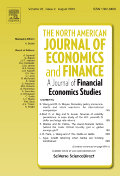
North American Journal of Economics and Finance
Pioneering research for a dynamic economic landscape.The North American Journal of Economics and Finance is a premier academic journal published by Elsevier Science Inc. since 1992, dedicated to advancing the field of economics and finance through rigorous research and scholarship. With an impressive impact factor and recognition in the Q2 category for Economics and Econometrics and Q1 for Finance as of 2023, this journal holds a significant position in the academic community, ranked #41 out of 317 in Finance and #100 out of 716 in Economics. The journal features high-quality, peer-reviewed articles that cover a broad range of topics, from theoretical frameworks to empirical analyses and practical applications. Though not an open-access platform, the journal provides valuable insights for researchers, practitioners, and students alike, promoting knowledge dissemination in the dynamic landscape of economic and financial studies. With its commitment to excellence, the North American Journal of Economics and Finance serves as an essential resource for those seeking to deepen their understanding of contemporary issues in these critical fields.
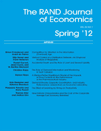
RAND JOURNAL OF ECONOMICS
Bridging Theory and Application in EconomicsRAND JOURNAL OF ECONOMICS, published by Wiley, is a prestigious peer-reviewed journal that has been a cornerstone in the field of economics since its inception in 1984. With a focus on empirical and theoretical research, it aims to bridge the gap between economic theory and real-world application, providing insights that are both rigorous and relevant. The journal holds an impressive Q1 ranking in Economics and Econometrics, reflecting its significant impact and influence in the field, evidenced by its Scopus rank of #199 out of 716 in related categories. Although it does not offer open access, the journal remains accessible to a broad audience through institutional subscriptions. Researchers, professionals, and students will find RAND JOURNAL OF ECONOMICS an invaluable resource for cutting-edge economic analyses and a vital platform for scholarly dialogue about contemporary economic issues.
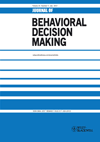
JOURNAL OF BEHAVIORAL DECISION MAKING
Empowering scholars to navigate the complexities of choice.The JOURNAL OF BEHAVIORAL DECISION MAKING, established in 1988 and published by WILEY, stands as a leading academic platform dedicated to advancing the understanding of decision-making processes through a behavioral lens. With its ISSN 0894-3257 and E-ISSN 1099-0771, this esteemed journal enjoys a prominent global presence, particularly in the United Kingdom. Its impressive impact is reflected in its 2023 category quartiles, achieving Q1 rankings in both Arts and Humanities and Sociology and Political Science, and Q2 rankings in Applied Psychology and Decision Sciences. The journal features rigorous peer-reviewed articles that bridge theoretical and practical research, making it an invaluable resource for researchers, professionals, and students alike. Its commitment to fostering interdisciplinary dialogue is further highlighted by its Scopus rankings, placing it among the top percentile in various categories. While not currently an open-access journal, the access options cater effectively to a wide audience, ensuring the dissemination of critical insights into behavioral decision-making practices. Join the vibrant community of scholars who are pushing the boundaries of this vital field of study.
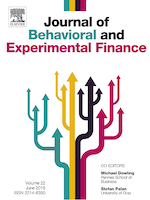
Journal of Behavioral and Experimental Finance
Unlocking Behavioral Insights for Financial InnovationJournal of Behavioral and Experimental Finance, published by Elsevier, stands as a premier outlet for groundbreaking research in the realm of finance, particularly focusing on the psychological and behavioral factors that influence financial decision-making. With an ISSN of 2214-6350 and an E-ISSN of 2214-6369, this journal has established itself within the top tier, achieving a Q1 ranking in Finance for 2023, and is currently positioned 10th out of 317 journals in the Scopus category of Economics, Econometrics and Finance, demonstrating a remarkable 97th percentile ranking. Aiming to bridge theoretical advancements with practical applications, the journal encourages submissions that explore innovative methodologies and empirical studies, offering valuable insights for academics, practitioners, and students alike. As a vital resource for those interested in the confluence of psychology and finance, the Journal of Behavioral and Experimental Finance is pivotal in shaping the future of financial research and practice.

American Economic Journal-Microeconomics
Transforming Research into Real-World Microeconomic SolutionsAmerican Economic Journal-Microeconomics, published by the American Economic Association, is a leading journal in the field of economics, focusing on microeconomic theory and its applications. With an ISSN of 1945-7669 and an E-ISSN of 1945-7685, this esteemed journal has established itself as an essential resource for researchers, professionals, and students alike, particularly noted for its Q1 ranking in the Economics, Econometrics and Finance category for 2023, placing it in the top tier of its field. The journal has continuously fostered academic excellence since its inception in 2009, and it provides a platform for innovative and rigorous research addressing contemporary microeconomic issues. With its high impact factor and robust Scopus ranking (Rank #82/288), the journal serves as a critical contributor to the advancement of microeconomic knowledge and practice. Explore groundbreaking research and insights as the journal spans a diverse range of topics, dedicated to the ongoing development of the discipline through high-quality, peer-reviewed articles.
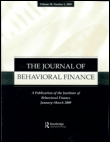
Journal of Behavioral Finance
Exploring the Psychology Behind Financial DecisionsThe Journal of Behavioral Finance is a pivotal publication examining the intersection of psychology and finance, offering insights into the behavioral aspects that influence financial decision-making. Published by Routledge Journals, Taylor & Francis Ltd in the United Kingdom, this journal provides a platform for researchers and practitioners to engage with cutting-edge research that covers diverse topics such as investor behavior, market dynamics, and emotional finance. With an ISSN of 1542-7560 and an E-ISSN of 1542-7579, the journal has established itself with an impressive standing, achieving a Q2 ranking in Finance and a Q3 ranking in Experimental and Cognitive Psychology according to the 2023 category quartiles. Furthermore, it ranks in the top 74th and 73rd percentiles in their respective fields within Scopus. The Journal of Behavioral Finance not only disseminates scholarly research but also fosters critical discourse, essential for academics, industry professionals, and students seeking to deepen their understanding of behavioral finance dynamics.

REVUE ECONOMIQUE
Connecting Scholars to the Heart of Economic ResearchREVUE ECONOMIQUE, published by PRESSES FOND NAT SCI POLIT in France, is a distinguished academic journal with an ISSN of 0035-2764 and an E-ISSN of 1950-6694. Established in 1974, the journal has evolved significantly over the years, focusing on a diverse range of topics within the field of economics, econometrics, and finance. With its commitment to presenting in-depth research and innovative perspectives, REVUE ECONOMIQUE serves as a vital resource for scholars, professionals, and students seeking to enhance their understanding of economic theories and practices. Although it is currently categorized in the Q4 quartile, ranking 241 out of 288 in the field, the journal aims to foster new dialogues and disseminate valuable insights that contribute to the economic discourse. The journal is not available as open access, but its rich repository of articles continues to attract readers interested in the complexities of economic dynamics. For more information, you can refer to their address at 27 RUE SAINT-GUILLAUME, 75341 PARIS 07, FRANCE.

JOURNAL OF INSTITUTIONAL AND THEORETICAL ECONOMICS-ZEITSCHRIFT FUR DIE GESAMTE STAATSWISSENSCHAFT
Fostering critical insights for academia and policy-making.JOURNAL OF INSTITUTIONAL AND THEORETICAL ECONOMICS-ZEITSCHRIFT FUR DIE GESAMTE STAATSWISSENSCHAFT is a distinguished publication dedicated to advancing the fields of institutional and theoretical economics. Published by J C B MOHR in Germany, this journal serves as a critical platform for scholarly discourse and research dissemination, encouraging contributions that delve into economic theory and its practical implications in institutional contexts. With an ISSN of 0932-4569 and an E-ISSN of 1614-0559, it enjoys a respectable position, having achieved a Q3 ranking in Economics and Econometrics according to the 2023 categorization. This journal, which bridges theoretical frameworks with real-world applications, is vital for researchers, practitioners, and students seeking to deepen their understanding of economic systems and institutions. Although not an open-access journal, it provides insights valuable for both academia and policy-making. Operating since 1992, with a commitment to rigorous peer-reviewed scholarship, the JOURNAL OF INSTITUTIONAL AND THEORETICAL ECONOMICS remains a pivotal resource in the evolving landscape of economic research.
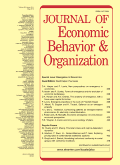
JOURNAL OF ECONOMIC BEHAVIOR & ORGANIZATION
Bridging Theory and Practice in Economic BehaviorJOURNAL OF ECONOMIC BEHAVIOR & ORGANIZATION, published by Elsevier, stands as a pivotal platform at the intersection of economics, organizational behavior, and human resource management. Established in 1980 and continuing its impactful contribution to scholarship, this journal holds a prestigious Q1 ranking in both its primary categories for 2023, signifying its significance in advancing research in these fields. The journal’s rigorous peer-review process ensures the publication of high-quality articles that delve into the complexities of economic decision-making and organizational dynamics. Researchers and practitioners alike benefit from its comprehensive analyses and innovative insights, making it an essential resource for those seeking to understand the intricate interplay between economic behavior and organizational structures. With its wide-reaching implications and adherence to excellence, the JOURNAL OF ECONOMIC BEHAVIOR & ORGANIZATION is poised to continue shaping the landscape of economic and organizational research through 2024 and beyond.